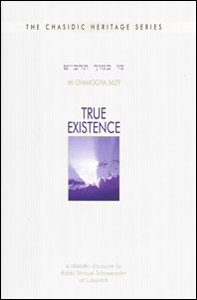* True Existence: A Chassidic Discourse on the Unity of G-d
 By Rabbi Shmuel of Lubavitch (The Rebbe Maharash).
By Rabbi Shmuel of Lubavitch (The Rebbe Maharash).
This Chassidic discourse from 1869 C.E. explains why the concept of a “partner” with G-d is false. It also explains how everything in the physical realm has a corresponding root and source in the spiritual realms. Yet, physicality itself is created directly by the Essence of G-d, and not by a cause and effect process.
To purchase book (with CD options): CLICK HERE
To read this book on-line: CLICK HERE
Reviewed by Rabbi Moshe Weiner, author of Sheva Mitzvot HaShem, The Divine Code, and Seven Gates of Righteous Knowledge:
Synopsis and analysis of the discourse
The mistaken concept of a “sheetuf” (a “partner” with G-d) is the idea of is an independent creation or being. For example, one could imagine that there is an angel functions independently of G-d. Jews are commanded against this from the verse, “Hear O Israel, the L-rd our G-d, the L-rd is One.” They are to believe and accept the truth that there is no independent existence other than G-d.
Everything “else” is created and truly is only functioning according to G-d’s decree. The classic analogy for this is an axe in the hand of a woodcutter. The exception within the creation is a human being, who uniquely is given free will. A person is permitted by G-d to function as he likes. Nevertheless, Gentiles are not commanded to reject the concept of a sheetuf, but it is righteous to do so.
It seems from the Rebbe Maharash that Rambam also accepts this (this is not explicitly said in the discourse), because this is from the commandment “Hear O Israel…” (which Gentiles are not commanded), and not from the commandment, “You shall not have for yourselves any other gods before Me” (that is an obligation for Gentiles, from their Noahide Commandment that prohibits idolatry).
The transgression of worshiping a sheetuf
The Rebbe Maharash nowhere says that a Gentile has permission to worship some existence that he views as a sheetuf. Rather, he differentiates between a sheetuf as an outcome of “Hear O Israel,” vs. as an outcome of “You shall not have for yourselves any other gods….” Thus, it is obvious that he also holds that worshiping a sheetuf is idolatry. It is obvious that thinking that an angel is independent does not force one to worship it.
Therefore a Gentile who worships any sheetuf is liable for transgressing the Noahide prohibition of idolatry. One who thinks that such worship is a worthy conduct, even though he does not worship the sheetuf, is wrong. In my understanding of Rambam, Laws of Repentance 3:7, he is a “deviant believer” (a “min” in Hebrew).
Note: mankind is even forbidden to worship people, who have the unique quality among the creations of having free will, which even angels do not have. Even one’s parents, who one is obligated to honor (who are free-will “partners” with G-d in the conception of a child), as the Rebbe Maharash explains in the discourse, are not classed as a special type of sheetuf that one would be permitted to worship, G-d forbid.
Published by Kehot (98 pages).








